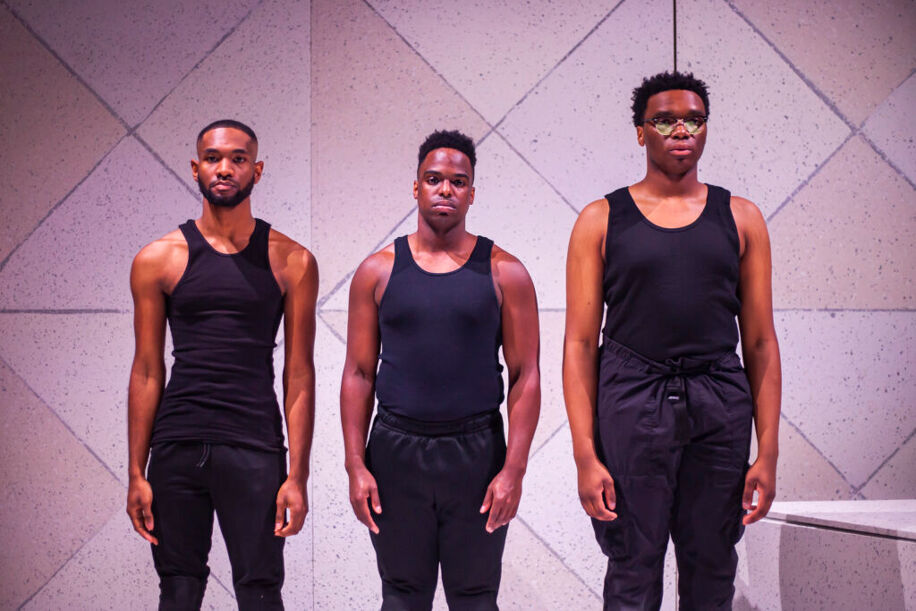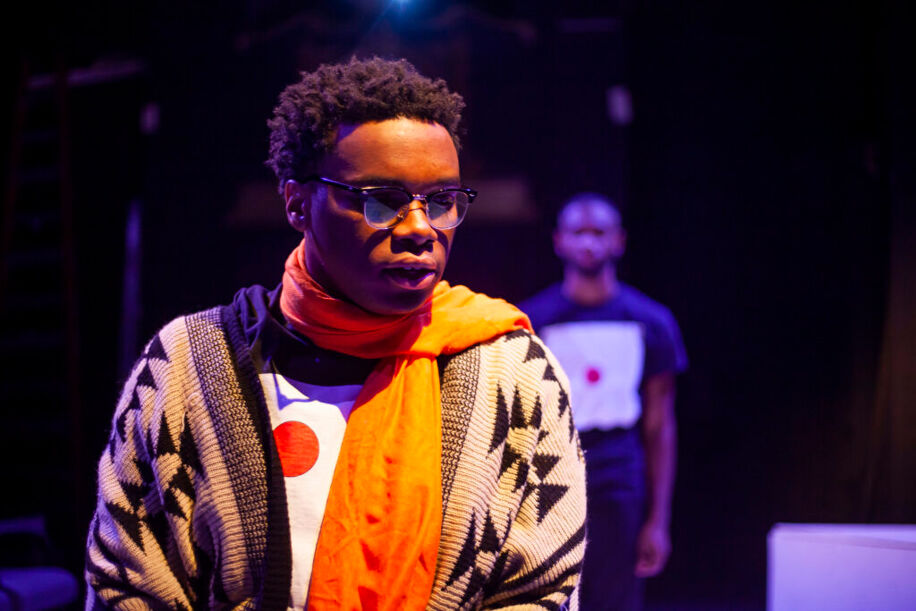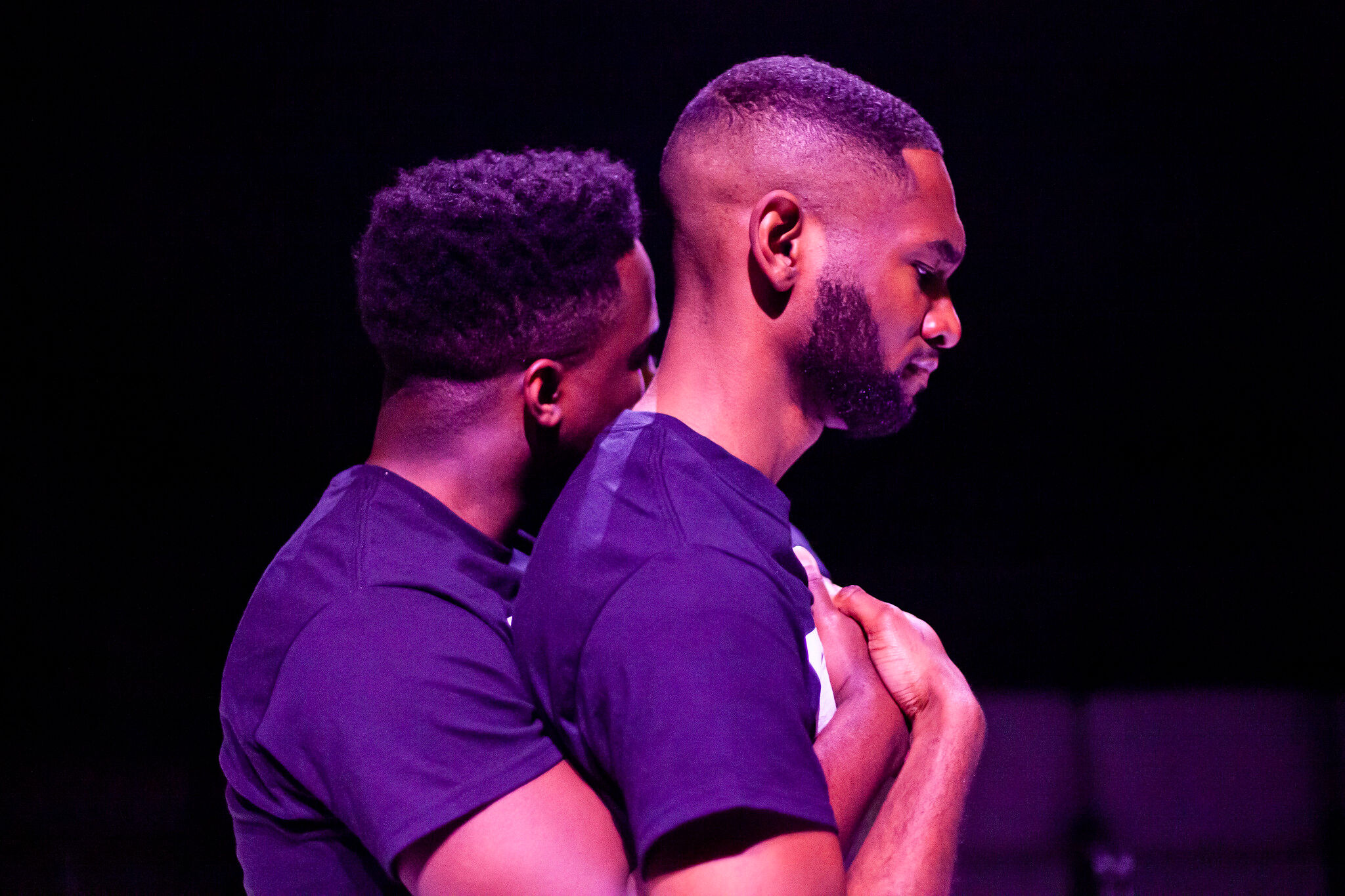Most regular theatergoers are familiar with the emergence of the “AIDS play.” The Normal Heart and Angels in America (parts I and II) received star-studded HBO adaptations, RENT has become an international phenomenon, and most recently, The Inheritance, which played in London and New York and recently received its West Coast premiere. Most of these plays have large casts and epic plots, two boast seven-plus-hour running times, and all tell of the pandemic that has plagued queer men for decades. All are quality stories, but cis white men remain at the forefront of all of them.
Donja R. Love’s one in two tells a different story.
From its preshow, where three Black queer men (Jonathan Samuel Allsop, Anania Williams, and J. Xavier) gossip and dance to pop music in the studio space of Chicago’s Pride Arts Center, Donja R. Love’s one in two shatters the “AIDS play” mold. On the surface, the differences are obvious: one in two is only 90 minutes, as opposed to seven hours. Unlike The Inheritance and RENT, it’s not reimagining century-old text. There’s a small cast and a single set. The particulars are intimate, the play’s story even more so.

Love is an Afro-Queer playwright whose work has been produced at Manhattan Theatre Club and Atlantic Theatre Company. He’s a 2021 recipient of the Terrence McNally Award and founder of a community and advocacy arts organization for LGBTQ+ people of color. He’s been living with HIV for over a decade, and one in two — named for the sobering statistic that one in two Black gay or bi men in America will be diagnosed with HIV in their lifetime — is his story.
Another stark difference between other “AIDS plays” and one in two is one that the character Donté (beautifully played by Allsop at this performance) notes himself: many narratives fixate on AIDS as a death sentence rather than focusing on the stories of those living with HIV.
Related:
Rasheed Newson Talks Activism and Sex Positivity in His New Book My Government Means to Kill Me
“I hope my readers walk away from the book feeling liberated and feeling like they don’t have to play by the older rules anymore”.
Even the recent TV series Pose, which centered BIPOC queer characters before and after diagnosis, took this stance. Like many of the plays before it, Pose was set in the ‘80s and early ‘90s, when the fate of the positive was often grim. Donté’s nurse reminds her new patient that he’s lucky: he has access to medication as well as a support group that will help. HIV/AIDS isn’t the death sentence it was 30 years ago, but whether Donté thrives or merely survives is up to him.

one in two is set in a sterile waiting room, with actors pulling various costumes and props out of toybox-like structures, including, in a memorable early scene, three dildos to play Donté’s family members, past and present lovers, and support group members (Xavier provides comic relief as a loud and flamboyant ballroom aficionado.) As Donté stumbles through the years post-diagnosis, drinking away the pain and ignoring the writing that was once paramount to his existence, a number projected on the set’s white wall steadily increases, and a clock can be heard ticking away. Once Donté is on the road to acceptance, though not without justified anger that Black queer men’s diagnoses are so high, and their stories largely ignored, the number on the wall finally settles, and the total, presumably of these same diagnoses, is staggering.
Related:
At 7 Hours Long, The Inheritance Still Doesn’t Tell the Full Story of HIV/AIDS
The two-part, seven-hour play performed over two nights (or one very long day) is a reimagining of E.M. Forster’s “Howard’s End” that originally premiered at London’s Old Vic in 2018.
Directed by Jordan Ratliff for Chicago’s PrideArts, one in two lovingly renders an important addition to the “AIDS play” canon with intimacy, immediacy, and specificity. While this is Love’s story, it’s also that of the “one in two” who are diagnosed and must go on, with the knowledge that everything has changed and the compassion and understanding of the outside world may be starkly limited.
Thanks to Ratliff’s creative staging, the actors’ stellar performances, and Love’s deliberate writing, the play forces audience members to acknowledge that AIDS is not a problem of the past, but an epidemic of the present.♦
one in two plays at Chicago’s PrideArts through March 19.
Don't forget to share:
Help make sure LGBTQ+ stories are being told...
We can't rely on mainstream media to tell our stories. That's why we don't lock our articles behind a paywall. Will you support our mission with a contribution today?
Cancel anytime · Proudly LGBTQ+ owned and operated
Read More in Entertainment
The Latest on INTO
Subscribe to get a twice-weekly dose of queer news, updates, and insights from the INTO team.
in Your Inbox















